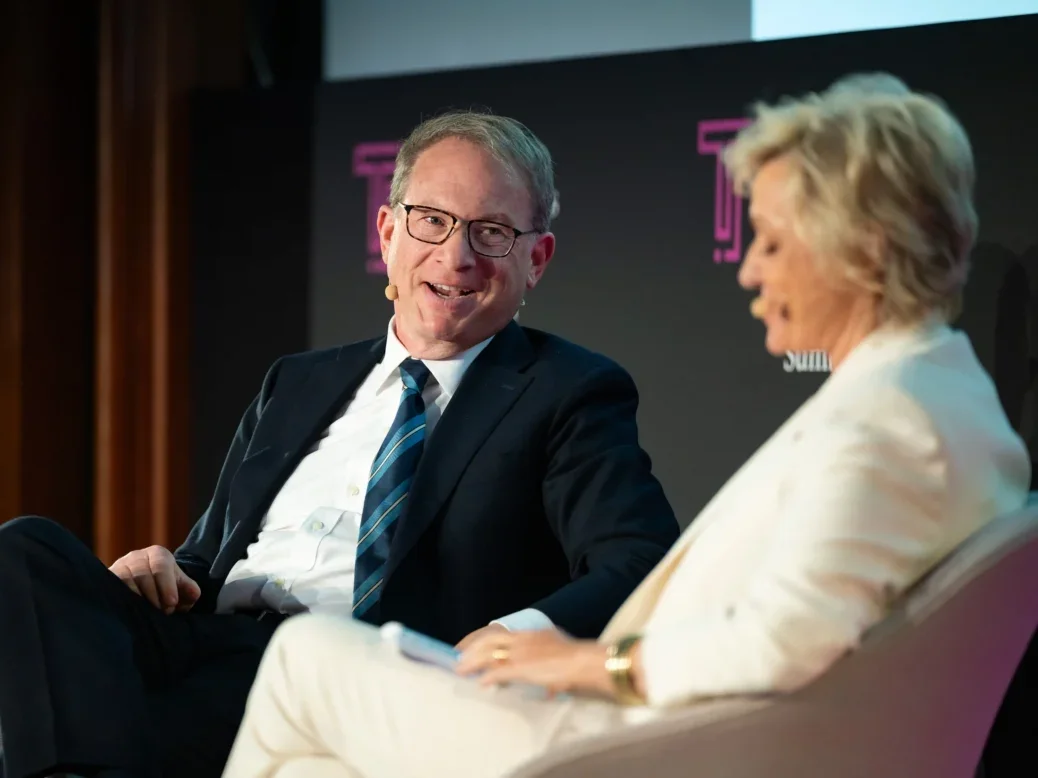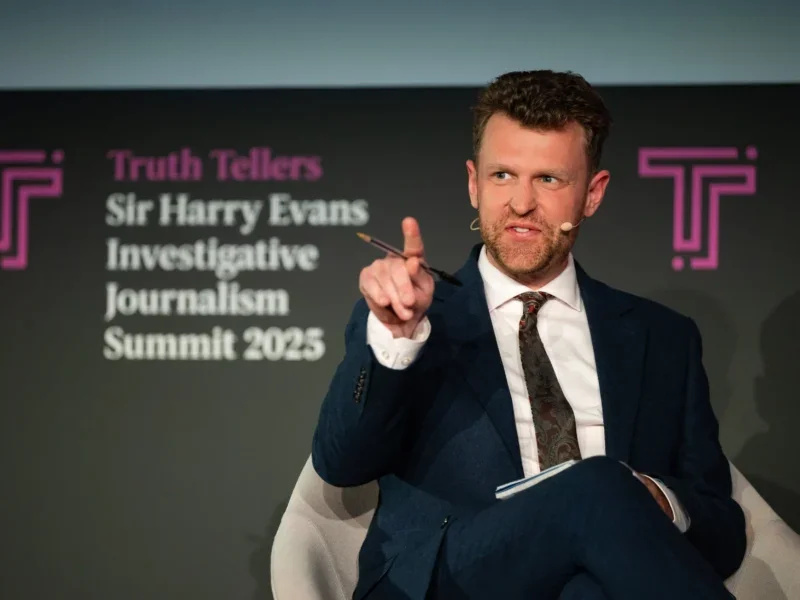
Editor of The Atlantic Jeffrey Goldberg has said of his blockbuster “Signalgate” scoop that journalism is “a simple business”, arguing audiences “know what a quality story is” and will pay to read it.
Speaking at the Sir Harry Summit in London on Wednesday, Goldberg said his accidental addition to a sensitive Trump administration group chat had been “too stupid to be believed”.
Figures within the administration responded to The Atlantic’s story by either denying the significance of the security breach or questioning the ethics of Goldberg’s decision making, ultimately prompting the magazine to publish the full group chat transcript.
The editor said that “the silliest part of that, for me, was I didn’t ask you to send me this. This is not an Edward Snowden type of situation where the source is leaking to me. I was just sitting there. It was a very millennial investigation, some would say.”
Asked by event organiser and former Vanity Fair editor Tina Brown whether he had debated staying in the group chat longer, Goldberg said: “People always forget, in this conversation, the existence of this profession called lawyers. By that Sunday I had, and our company had, national security lawyers, First Amendment lawyers and criminal lawyers… a lot of lawyers made a lot of money.”
He said he did not “want to go into it too deeply – I mean, anything can happen with this administration, so I don’t want to go down that road too much. But I think the ethical thing to do was to leave the chat and let them know as soon as possible what I had seen.”
Asked what lessons he had taken away from the denials and abuse that had ensued, Goldberg said he had resolved that “the only way to operate in this environment is to refuse to be bullied… When you push back – and the truth is on your side – well, then fine.
“I think we live in an incipient authoritarian climate, but we still can publish what we want to publish. When I was invited to the White House [for an interview last month], I didn’t think I was going to end up in El Salvador.”
Brown said she “couldn’t help but smile” when reading Trump’s Truth Social post announcing the sit-down because he said: “The story they are writing, they have told my representatives, will be entitled, ‘The Most Consequential President of this Century.’”
Goldberg responded that Trump had posted the phrasing “because he doesn’t know that consequential is a neutral word… Syphilis is the most consequential venereal disease.”
He added quickly: “I’m not equating anyone in the White House to any venereal disease whatsoever.”
Jeffrey Goldberg: Being a magazine gives The Atlantic ‘an advantage’ when covering the Trump administration
Goldberg said the interview had emphasised that Trump is “much more accessible than Joe Biden was”.
The thing people “don’t understand” about the president, he said, was that “he’s very charming, very charismatic [but] also does things that I, obviously from a media perspective and every other perspective, don’t appreciate. The job of a journalist in that setting is to not lose yourself”.
Trump had attacked Goldberg on Truth Social immediately ahead of the interview, but when the Atlantic editor arrived in the Oval Office, he recalled, “it was very friendly, very warm. And I say: ‘Thanks a lot for the Truth Social post, that was really helpful!’
“And he says – and this goes to the core of what he is – ‘I was just trying to put a little more pressure on you. Anyway, you’re going to sell five times the number of magazines now.’ There’s always a transaction – he understands a transaction at a very basic level.”
Goldberg previously scooped Trump’s infamous comments about killed American troops being “losers” and “suckers”, but Goldberg said the president told him he’d thought the group chat story had been “more successful”.
Goldberg said he was confused by the comment, asking: “Successful? As in, ‘Oh, thank you for helping us uncover a flaw in our national security communication system?’
“And he said: ‘No, no! You were very successful, you got a lot of attention.’ I won that round because I got a lot of attention. And that’s what he cares about.”
Goldberg said Trump “understands that you can overwhelm people with ideas and words, word clouds and executive orders. Every day is a kind of Watergate at this point”.
But amid the extremely busy news environment, Goldberg said The Atlantic had “an advantage” being a magazine, rather than a newspaper expected to “cover everything”.
“There’s no expectation on the part of our readers, when it comes to us, that we’re going to have a compendium of news. We can pick the things that obsess us the most.”
He added that he wanted to make “a larger point”, which was “a critique of everyone, including me”. In journalism, he said, “we forget that the first thing you have to do is be interesting. It doesn’t matter if you have the world’s greatest investigation – if people can’t get past the lede without falling asleep, it really doesn’t matter that much.
“So I do think about what’s interesting, and how do we tell the story in a way that would be different from others. [There] has to be value added to it: what lane is fairly empty? What writer do I have who can actually talk about this in a more interesting way and build some kind of narrative propulsion into it?”
Ultimately he said journalism was “a very simple business: you just have to make great stories and convince the readers of those stories to pay you to read those stories.
“The market understands what a quality story is. Our readers understand it. Tens of millions of people in America, and everywhere, understand what a quality story is. Just make the best possible journalism, the most honest, truthful, interesting, well-written, well-produced journalism, and everything works out. I really do still believe that.”
[Read more: What’s next for The Atlantic after reaching profitability and 1m subscribers]
Goldberg says Laurene Powell Jobs has ‘never once tried to interfere’
Goldberg said The Atlantic’s proprietor, Laurene Powell Jobs, had “never once tried to interfere in the way we cover anything, which is really all you can ask”.
Brown contrasted Powell Jobs with the more interventionist owners of The Washington Post and The Los Angeles Times, Jeff Bezos and Patrick Soon-Shiong, asking whether Goldberg felt “her freedom from business conflicts has allowed you so much editorial freedom”.
Goldberg responded that she hadn’t succumbed to political pressure because “she has good character, and she also understands the nature of what it means to be a publisher in the United States”.
He said she had previously spoken to The Atlantic’s staff about “these eruptions taking place at The Washington Post and The Los Angeles Times. She said: ‘You know, I’ve never gotten so much credit for simply standing still.’
“But that’s the thing, standing still in the storm is an action. And just saying: our values are intact, they don’t change with the shifting winds – I think people respect that, and certainly the readers respect that.”
The Atlantic’s success was also invoked by Tom McTague, the new editor of the New Statesman who started the job a day earlier, on a separate panel about the “eyeball economy”.

Asked by CNN’s Brian Stelter how he planned to shape the magazine, McTague – most recently political editor at Unherd – said the “heritage brands” who had “failed” to move online had generally “abandoned what made them great” as print products. “They chase clicks, they chase pure traffic.”
He quoted Goldberg, his old boss at The Atlantic who had visited him in the New Statesman office on his first day in the new job, saying: “It comes back to real basics – we’re in the hits business. Jeff Goldberg told me the other day: ‘We’re there to break stories, give people information that they didn’t have, write the best journalism possible.’
“And I think that if you do that, people will pay for it. And that’s ultimately what we need to do to drive our subscribers.”
Email pged@pressgazette.co.uk to point out mistakes, provide story tips or send in a letter for publication on our "Letters Page" blog
